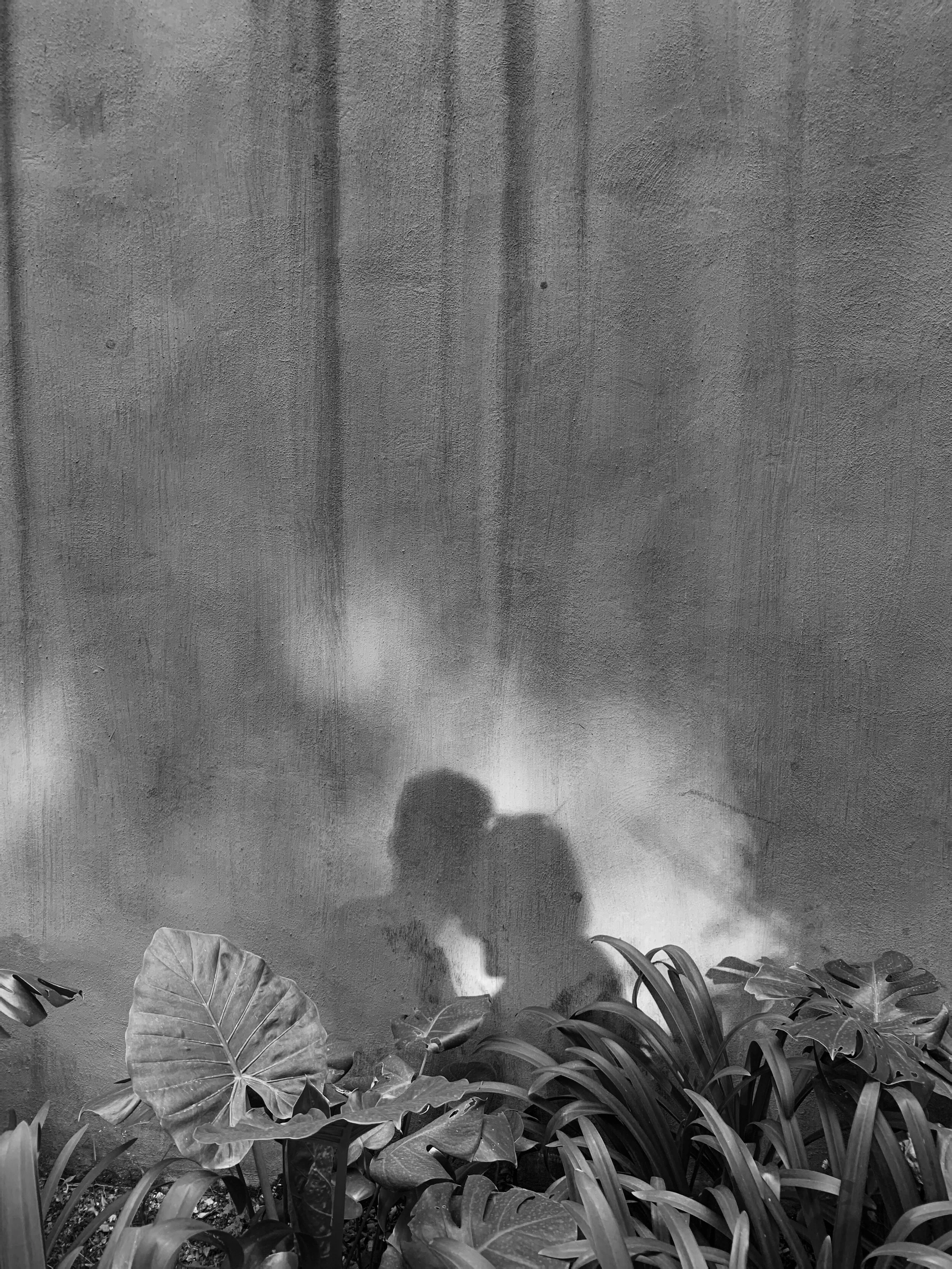More than Once in a Lifetime

More than Once in a Lifetime
Aarik Danielsen
God willing, I will turn 40 with two weeks to spare in this dizzy year. The proof of my commitments are piled up around me.
Firefighter gear in miniature lay recently worn on my floor, the property of a 7-year-old obsessed with the occupation. Stray books I need to review or return lay strewn across many surfaces. Each corner of our modest Midwestern home marked subtly by my wife, color brought to once-neutral walls, chaos converted into order.
In daylight hours, I wade through the remains of my son’s play. My eyes wander heavenward, only to spot the tiny fault lines which stretch across our ceiling. And David Byrne’s reservations become my own. I ask myself, “How did I get here? This is not my beautiful house... This is not my beautiful wife.”
Sally Thomas, a contemporary poet residing in North Carolina, threads something like recognition—fragments of a fugue state—through her character’s thinking, mirroring my own strange recognitions of a life lived around the home; around the family that I am sometimes surprised to find is my own. The title of Thomas’ book Motherland comes from the poem “In That Place”. There, the central figure watches from her window as a young mother guides a stroller across pavement. “You’d see her plod through rain, her thoughts opaque / To you as the sky that veiled the wet white sun,” she writes. The older woman recalls being a young mother once herself, sharper memories and sturdier meanings occupying her now slippery mind.
“Everywhere you went, you were her motherland,” Thomas writes of the connection to one’s offspring. If the reader is bound by any of the obligations and delights of family life, they will find swells of resonance in Thomas’ poetry. She describes how husbands and wives, mothers and fathers, become homes to one another, and yet struggle to dwell peacefully within themselves.
Corina Straub
Thomas draws the patterns of entanglement and detachment that come along with having to answer for more than yourself. Her speakers constantly shift their weight from burden to blessing. People within her poems pay respect to the irrevocable truths which make adulthood survivable and sustainable: Have a short memory, shake off your failures. Everything that counts soaks through the skin.
Consider the opener “Change-Ringing,” where motherhood toes the tightrope between spiritual discipline and something entirely earthbound. Thomas doesn’t merely set the scene of a mother breastfeeding—she considers which sensory memories outlive the moment of nurture. Yes, the mother remembers the feel of her child, and the life drained from her; but she carries the impression of “church bells, mainly.”
“Nightly, daily, / As the baby fed, their ringing / Echoed the rhythm of sigh / And suck, the lashes fluttering / On the flushed cheek. You try / To sort through images cluttering / Your mind’s dark attic, and / That’s what you come up with: bells,” Thomas writes.
I cannot fathom the particular depths hidden within a mother, but this pendulum swing between reveries overlays my experience of parenting. What you feel lingers longer than what you do. My son begs for stories about younger versions of himself, and too often, all I have to offer is the sound of church bells, “A wordless shape-note singing / On the sky.”
To love another person—by birth or adoption, blood or marriage—stretches the self to the point of tearing muscle from bone. Commitment moves us from affection to resentment and back, often within a span of seconds or the duration of a glance. Thomas’ poems describe this blessed unsteadiness the way a priest describes God; precision dancing with mystery, the unknowable holding hands with scripts written across the soul at creation.
A poem like “Obscure Constellation in Winter” reads like a homebound liturgy, a confession of the acts we’ve left undone, and an implicit word of pardon: “At this hour, all / The little varied fires you tried to start / Sink to embers. / Dirty dishes oversprawl / Your kitchen. / The whole house threatens to outsmart / You again.”
Duties which threaten to undo our souls, when accomplished, become evidence for beatification. A load of laundry, shepherded through the spin cycle, is “transfigured, made whiter, brighter, / By the alchemy of grainy vinyl floor” (“Laundromat”). A moment spent observing other living things reminds us “There’s a bravery / In doing—Whatever it is. / ... Work, this pilgrimage of habit” (“Bees”).
Thomas constantly lights the fuses of little joys. Any parent who finds strange syntax escaping from their mouth—which is every parent—will appreciate the exultation within “New Year’s Day”: “Somehow we never imagined / Having to say, Take your feet / Off the celery. Don’t lick me. / The corkscrew is not a toy. / What did we expect?”
In “For You,” she coaxes all the mirth from a conversation happening this instant in countless homes. Doing so, she subverts the axiom that a parent cannot or will not choose between children. “Am I your favorite? you want to know, / So I say yes: As every breath I take’s / My favorite breath. If, say, you’re eight, that makes / You my favorite eight-year-old.”
Juni Son
The exchange ends with an undivided soul willing to betray itself for another’s sake: “Love’s strange, elastic laws / Grant each child its un- diluted part, / And that, my love, is what I offer you.”
Thomas’ poetry isn’t only concerned with the thousand tiny homecomings which happen daily within the borders of Motherland. She slips between the layers of marriage, transcribing with lovely, painful clarity. She captures the paradox of covenant, all matter and antimatter, glowing lights and grinding gears.
On some level, Thomas asserts, every husband and wife simply plays their predetermined role. We present evidence of evolution, overlaying animal behavior with degrees of sophistication. Thomas sees our shape, and that of her own love, in birds; newlywed goldfinches alight on “our feeders in marital / Exaltations. Quarrel / and rapture played daily on our / Drawn drapes, a theater / Of flitting shadows” (“Morning, with Goldfinches”).
Other natural phenomena provoke this notion: “There are weddings every day, / All of them ours. / We marry the way the window / Clouds, by shapes / Breathed onto us, the dim spot / We write our names in, / Words that are clear- est / When they evaporate” (“White Morning, Crows”).
Thomas’ poems make neither a cathedral nor a prison of domesticity. Rather she adjusts her aperture to capture marriage at many frames per second. She traffics in the truest stuff, the major and minor matters I recognize after 15 years sharing a bed and a name with my wife.
Young love awakens to realize it has spent more time with someone than without them. Process- ing that reality evokes images of the nails we drive into plaster like promises, of fights that carry years’ worth of invisible freight, of every word our body language mistranslates, every time we shame and shame alike.
Thomas proves herself an eminent poet of rain and damp, light and contour and creatureliness. But her truest achievement is lending language to these experiences, the ones which take up the secret places yet feel almost impossible to shepherd from thought to tongue.
“Anniversary” testifies the way wedding vows become new marrow: “Every day we choose / Not to unsay them, as we don’t leave our bed / A surf of twisted sheets, striped mattress naked / To the morning’s white merciless gaze.”
Every spouse who tends the soil of love, watching perennials and fresh buds bloom, has the poem’s closing couplet memorized: “You’ve pinned your socks together for the wash, / I’d dress up now and marry you again.”
Thomas claps out the slower rhythms of lifelong companionship; she also captures those rare but vivid moments in which one partner feels they cannot draw close enough. “Still, after twenty years with her he wants / To prise her open, bone from hinging bone—/ As needed—to expose the secret soul,” she writes in “Introvert.”
Near the end of “New Year’s Day,” she reads my mail: “All of you, husband, children, / Calling my name, calling me / Back from myself, back into / Myself. Erasable / Only by death. This / Must be what it means, / One flesh. I carry / Your voices in the pocket / Of my ear. We speak / Of making vows, lovemaking, / As if such things didn’t exist / Until we think. / And they occur to us.”
Thomas composes poetry like Jude wrote doctrine. In verse 21 of the biblical author’s brief letter, he pens a line so sure, yet so inscrutable, it prefigures our greatest poets. “Keep yourselves in the love of God,” he encourages his audience.
A friend once preached this passage, flipping over both sides of the coin for examination. Heads, a caution: walk in the way of the wise. Cling to orthodoxy. Tails, gaze upon the audacity of grace. Jude’s instruction resembles the religion-in-reverse from the Sermon on the Mount, as Jesus admonishes his audience to keep the inner law. Facing our lack, we realize our need for saving. “God’s love keeps you in God’s love,” my friend concluded in his sermon.
Thomas draws this duality to everyday scale. The arrow splits at the target, pointing both horizontally and vertically. My fidelity, my ability not to run too hot or cold, my awkward side hug of humility, keep me in the love of my family. But so does fresh morning mercies, the gravitational pull of the divine, which attracts two or more souls like a magnet. God’s love keeps me in their love. His grace keeps them in mine.
More than once in a lifetime, David Byrne’s questions return. Thomas answers on our behalf.
“How did I get here?” I can’t draw you a map, but I always end up right back where I started.
“This is not my beautiful wife.” Actually, she is. We’ve welcomed each other ten thousand times, each choice a mystery.
A covenant-shaped life assents to Thomas’s words near the end of “In That Place”: “Home was a thing you made out of light and warmth. / Life is a thing you make of what you’ve discovered.”
Maybe this is the best we can hope for. Maybe it’s more than we ever deserved.
Aarik Danielsen
Writer & Journalist
Aarik has been published in Image Journal & Fathom Magazine
Photography by Corina Straub

